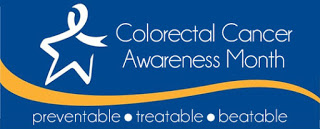Kentucky leads the nation in colon cancer, but it’s 90% preventable through screening, which is easier than ever

All too often Kentuckians don’t get screened for colon cancer because of fear, embarrassment, lack of access and cost concerns, but with March being National Colorectal Awareness Month it is a good time to reconsider these concerns, know that preventive screenings are covered by most health plans, and recognize that a decision to get screened could save your life.
“Fear is one of the biggest barriers to colon cancer screening,” Patty Francis, program director for the Colon Cancer Prevention Project, a nonprofit advocacy organization in Louisville, said in an interview. “But don’t let these fears get in the way of getting screened. Talk to your doctor about screening options, because colon cancer is very treatable—very beatable—if found at an early stage.”
In fact, it is up to 90 percent curable if detected early, says the CCPP website.
And while Kentucky has made great strides in its age-eligible colon cancer screening rates, going from 35 percent in 1999 to 66 percent in 2012, there is still great room for improvement; more than one-third of age-eligible Kentuckians have still not been screened.
As of 2013, the latest year data are available, Kentucky led the nation in colon cancer and is ranked fourth for deaths caused by it, according to the CCPP website. The state has nearly 2,000 new cases of colon cancer each year and more than 850 Kentuckians die from it each year, according to the American Cancer Society.
Colon cancer screening options
The colonoscopy is considered the best way to detect or prevent colon cancer because it finds cancer in its early states, when there are no symptoms, and can also find and remove pre-cancerous polyps. Other tests include a flexible sigmoidoscopy or virtual colonoscopy, but these don’t allow the doctor to check inside the entire colon and remove polyps.
Colonoscopies, which involves the use of a thin, flexible tube to examine part of or all of the colon, have come a long way over the years. The once-dreaded “bowel prep,” which is taken the night before the procedure, has become more palatable and takes less time to work. And contrary to popular belief, the procedure is painless. Patients are given medication to help them relax before the procedure and it is performed under mild anesthesia. The procedure typically takes 20 to 30 minutes, unless there are polyps that have to be removed, which makes it go a bit longer.
Also, there are several non-invasive screening tests that check for blood in your stool, which can be a sign of precancerous polyps or colon cancer. A positive stool-based test typically requires a follow-up colonoscopy. These tests should be done once a year.
When should I get screened?
By the age of 40, everyone should talk to their physician about their risk of colon cancer and make a plan for screening. Those with inflammatory bowel disease, a family history of colon cancer or colorectal polyps, certain lifestyle factors or genetic predispositions are at higher risk of colon cancer, according to the federal Centers for Disease Control and Prevention.
Those with average risk should start screening by age 50. African Americans, who are at risk of getting colon cancer at an earlier age, should start at 45.
It is estimated that six out of 10 deaths from colon cancer could be prevented if everyone were screened at age 50, but you need to discuss your screening needs with your doctor at age 40, Andrea Shepherd, executive director of CCPP, said in an interview
“One of the biggest myths is that colon cancer is an old man’s disease, but one in 10 people who are diagnosed with colon cancer are under the age of 50,” Shepherd said. “Colon cancer does not see race; does not see age; it affects everybody.”
The American Cancer Society lists these symptoms: a change in bowel habits that lasts for more than a few days; a feeling that you need to have a bowel movement that is not relieved by doing so; rectal bleeding; blood in the stool, which may make the stool look dark; cramping or abdominal pain; weakness and fatigue; and unintended weight loss.
But remember, the most common symptoms are no symptoms.
Screening colonoscopies for those who have insurance, or not
Last year, a new state law made clear that screening colonoscopies had to be paid for by insurance, effective Jan. 1. This includes colonoscopies performed as a result of a positive fecal-blood test as well as polyps that are found and removed during the screening colonoscopy. Some physicians are still not aware of this clarification, so it is important to discuss costs before any procedure is performed. And note that there is an appeals process if you are charged, Laura Ungar reports for The Courier-Journal.
The CCPP website says that this is not the case for Medicare patients, but their founder, Dr. Whitney Jones, is lobbying for this change in Washington, D.C.
Those who don’t have health insurance should contact the state’s Kentucky Colon Cancer Screening Program, which offers free screenings for qualified residents of Kentucky.
This year, Rep. Tom Burch, D-Louisville, has sponsored House Bill 115, which would expand KCCSP services to those who are “underinsured” as funds are available. This bill has passed the House and now resides in the Senate Health and Welfare Committee.
Those without insurance and also don’t qualify for the KCCSP program, but who are at high risk and have had a positive fecal-blood test, should have their primary care provider contact the Surgery on Sunday program, which provides outpatient surgical procedures to income-eligible individuals and operates out of Lexington and Louisville, for possible help on getting screened.
